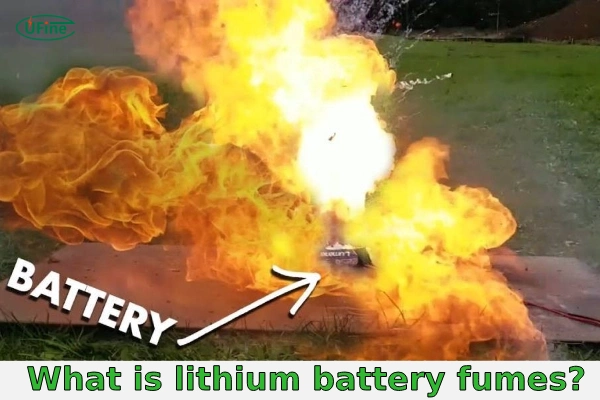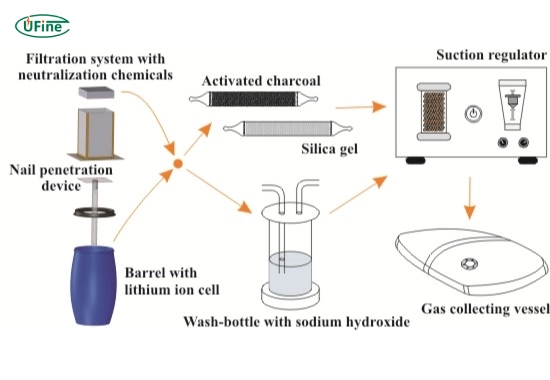Have you ever experienced or wondered what to do if you inhale lithium battery fumes? This guide explains the dangers, immediate steps to take, and how to protect your health. Lithium battery fumes contain toxic substances, and knowing the right actions can save lives.
Part 1. Lithium battery fumes
Lithium battery fumes are harmful gases released when a lithium battery is damaged or overheats. These fumes contain toxic chemicals that can hurt your health. Key components include:
- Hydrogen Fluoride (HF): A dangerous gas that can damage your lungs and skin.
- Carbon Monoxide (CO): A poisonous gas that can cause headaches and dizziness.
- Organic Compounds: Harmful chemicals that can irritate your eyes and throat.
Always be careful when handling damaged lithium batteries to avoid these dangerous fumes.
Part 2. What makes lithium batteries fume?
Lithium batteries can emit fumes due to several specific conditions. Here are the primary reasons:
- Thermal Runaway: When a battery overheats, it can enter a thermal runaway state. This occurs when the heat generated by the battery exceeds its ability to dissipate it, leading to a rapid increase in temperature and the release of gases.
- Mechanical Damage: Puncturing or crushing the battery can cause physical damage that breaches the internal cells. This damage allows the release of flammable and toxic gases contained within the battery.
- Overcharging: Charging a lithium battery beyond its recommended capacity can cause excessive heat buildup. This can damage the battery’s internal structure and lead to the emission of fumes.
- Internal Short Circuits: Manufacturing defects or damage can cause an internal short circuit. This creates an uncontrolled flow of electricity, generating heat and potentially leading to fume release.
- Chemical Reactions: Under certain conditions, such as exposure to extreme temperatures or a faulty battery management system, chemical reactions within the battery can become unstable and produce hazardous gases.
Is it dangerous to use a device with a damaged lithium battery?
Yes, using a device with a damaged lithium battery is highly dangerous. It increases the risk of fume release, fire, or even explosion. If you notice signs of damage such as swelling or leakage, stop using the device immediately and dispose of the battery safely.
Part 3. Risks of inhaling lithium battery fumes
Inhaling lithium battery fumes can be very dangerous. Here are the main risks:
- Respiratory Problems: Breathing in these fumes can irritate your lungs and airways. You might start coughing or have trouble breathing. In severe cases, it can lead to lung damage.
- Skin and Eye Irritation: Fume chemicals can cause burning sensations on your skin and eyes. You might feel pain, redness, and itching.
- Poisoning: Some of the chemicals in the fumes, like hydrogen fluoride, are very toxic. Inhaling them can lead to symptoms of poisoning, such as nausea, dizziness, and weakness. Severe exposure can even be life-threatening.
- Long-term Health Effects: Repeated or prolonged exposure to lithium battery fumes can cause chronic health problems. These include persistent respiratory issues and an increased risk of lung disease.
Always avoid inhaling these fumes to stay safe and seek fresh air immediately if exposed.
What are the symptoms of inhaling lithium battery fumes?
Inhaling lithium battery fumes can cause symptoms like coughing, throat irritation, and shortness of breath. Severe exposure may lead to chest pain, dizziness, or even loss of consciousness. Immediate medical attention is crucial if these symptoms occur.
Part 4. Immediate actions after exposure to lithium battery fumes
If you’ve been exposed to lithium battery fumes, taking prompt action to minimize potential harm is crucial. Here’s what you should do:
- Move to Fresh Air: Immediately leave the area exposed to the fumes and go outside or to a well-ventilated space. This helps reduce further inhalation of toxic gases.
- Seek Medical Help: If you experience difficulty breathing, chest pain, or severe skin irritation, seek medical attention immediately. Don’t hesitate to call emergency services or visit the nearest healthcare facility.
- Remove Contaminated Clothing: If your clothes have come into contact with the fumes, remove them carefully to prevent further skin exposure. Put on clean clothes and wash any affected skin with soap and water.
- Stay Calm: While feeling anxious after exposure to harmful substances is natural, try to remain calm. Panic can exacerbate symptoms and make it harder to take necessary actions.
- Dispose of Contaminated Items Safely: If the fumes have contaminated any objects or surfaces, handle them with gloves and dispose of them properly. Avoid touching your face or other body parts while handling contaminated items.
Part 5. Preventive measures for lithium battery fume safety
To ensure your safety and minimize the risk of exposure to lithium battery fumes, follow these preventive measures:
- Handle Batteries Carefully: Always handle lithium batteries cautiously, avoiding any rough treatment or dropping that could cause damage and potential fume release.
- Store Batteries Properly: Store batteries in a cool, dry place away from direct sunlight and heat sources. Avoid storing them in confined spaces where fumes could accumulate.
- Use Recommended Chargers: Only use chargers the manufacturer recommends for your specific battery type. Using the wrong charger can lead to overcharging and overheating.
- Inspect Batteries Regularly: Periodically inspect your batteries for signs of damage, such as swelling, leaking, or unusual odors. Replace damaged batteries immediately.
- Charge in Well-Ventilated Areas: When charging lithium batteries, do so in a well-ventilated area to prevent the buildup of fumes. Avoid charging batteries near flammable materials.
- Avoid Overcharging: Follow the recommended charging times and avoid leaving batteries charging for extended periods, as overcharging can lead to overheating and fume release.
- Dispose of Damaged Batteries Properly: If you damage a lithium battery beyond use, dispose of it according to local regulations for hazardous waste disposal. Do not attempt to use or repair damaged batteries.
Protecting children from damaged toys containing lithium batteries
Children’s toys often use lithium batteries, and damage to these batteries can release harmful fumes. Always inspect toys for cracks, swelling, or other signs of battery damage. If you find any issues, remove the battery immediately and dispose of it safely. Store replacement batteries out of children’s reach.
Safety tips for handling power tools with lithium batteries
Power tools often rely on lithium batteries for high performance. Avoid overloading or physically damaging the battery during use, as this can cause overheating or fume release. Always charge tools in well-ventilated areas and check for battery damage regularly to ensure safety.
A Comprehensive Guide to Lithium-ion Battery Safety
Part 6. FAQs
-
Are lithium battery fumes dangerous?
Yes, lithium battery fumes can be hazardous if inhaled. They contain toxic substances such as hydrogen fluoride and carbon monoxide, which can cause respiratory problems, skin irritation, and even poisoning. -
How can I tell if a lithium battery is emitting fumes?
Signs of fume emission from a lithium battery include unusual odors, hissing or sizzling sounds, swelling or bulging of the battery casing, and visible leakage of fluids or gases. -
Are lithium battery fumes flammable?
Some components of lithium battery fumes, such as hydrogen fluoride, can be explosive. Handling and storing lithium batteries with care is essential to prevent fire hazards. -
Can lithium battery fumes cause explosions?
In rare cases, lithium battery fumes and other factors like heat or mechanical damage can contribute to battery explosions. However, proper handling and preventive measures significantly reduce this risk. -
Can inhaling lithium battery fumes be fatal?
Yes, inhaling lithium battery fumes can be fatal in severe cases. Toxic substances like hydrogen fluoride can cause acute poisoning, leading to life-threatening conditions, especially if exposure is prolonged or concentrated. -
How long do lithium battery fumes linger in the air?
The duration lithium battery fumes linger depends on ventilation. In poorly ventilated spaces, fumes can persist for hours, increasing exposure risks. Proper airflow can disperse fumes within minutes, reducing danger. -
What should I do if my child inhales lithium battery fumes?
If your child inhales lithium battery fumes, move them to fresh air immediately. Wash their face and eyes with water if irritation occurs. Seek medical attention promptly, even if symptoms seem mild, as toxic effects may develop later.
Related Tags:
More Articles

High‑Capacity 3S LiPo Batteries: 5000 mAh vs. 10000 mAh
Compare 3S LiPo 5000mAh vs 10000mAh batteries by weight, power, and use. Find the best fit for your drone, RC car, or boat setup.
Top 5 Applications for Small 3S LiPo Batteries
Small 3S LiPo batteries power drones, RC gear, wearables, and robotics with high energy and low weight. Making them ideal for compact electronics projects.
Building and Charging Your Own 3S LiPo Pack: A Step‑by‑Step Guide
Learn how to build, balance, and charge a 3S LiPo battery pack safely at home with this complete DIY guide for hobbyists and beginners.
How to Choose the Right LiPo Battery Plug Type?
Discover the best LiPo battery plug types, how to choose them, and expert tips for safe usage, soldering, and maintenance.
Choosing the Right Connector for Your 3S LiPo Battery
Choosing the right 3S LiPo connector depends on current, space, and use. Learn the pros and cons of XT60, JST, EC3, and more.





